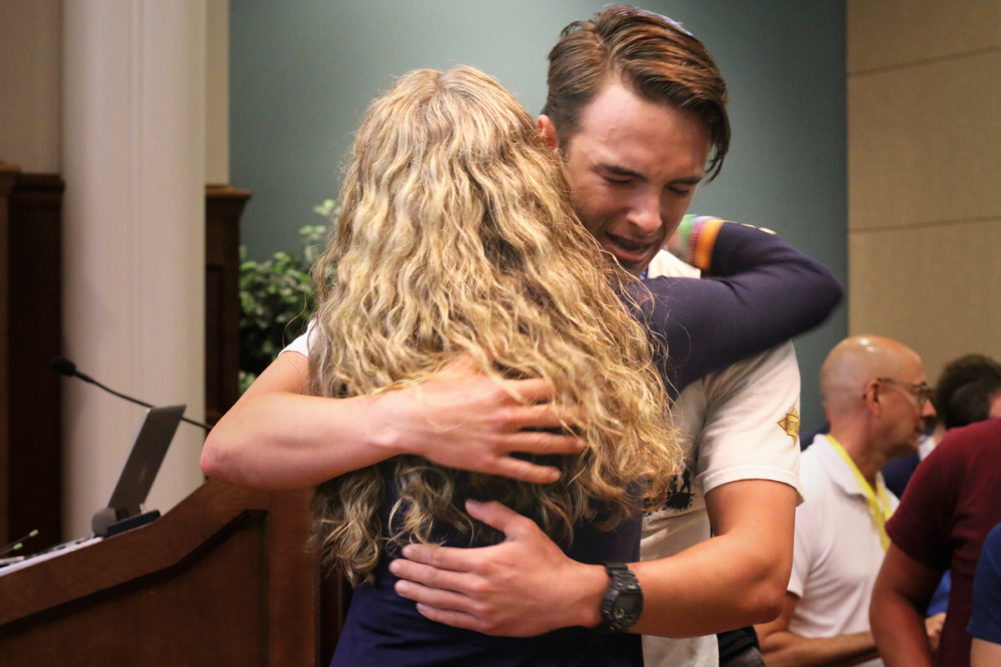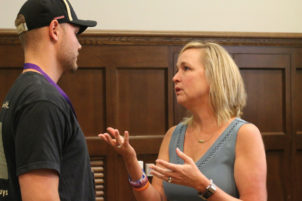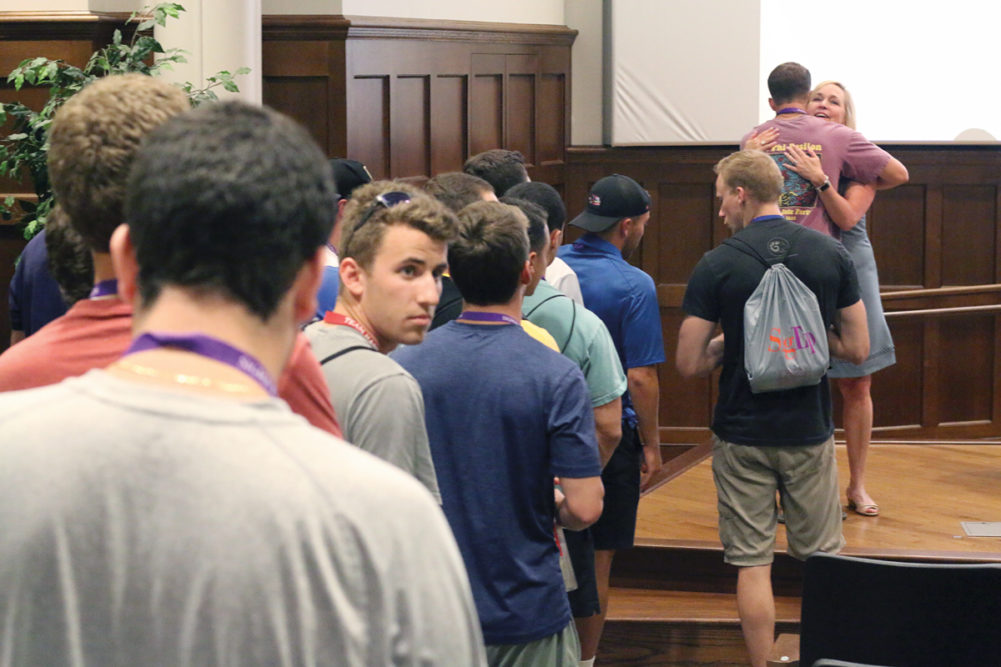In an auditorium at the University of Richmond in Virginia, two women sit together on a stage talking. There’s a podium with a microphone, and camera equipment is being set up as people stream in to find a seat. The audience, composed mostly of undergraduate SigEps from chapters across the country, has come to hear them share how hazing devastated their lives and learn what they, as leaders, can do to combat hazing on their campuses.
Evelyn Piazza and Rae Ann Gruver have dedicated their lives to ending hazing. But, this isn’t the life they envisioned.
In an instant, the Piazza and Gruver families became headline news when their sons died in 2017 from injuries received while pledging fraternities. Even as they struggled to make sense of what happened and bring those responsible for their sons’ deaths to justice, Piazza and Gruver knew they needed to speak out. They have become outspoken advocates, challenging university officials and fraternities to address the safety issues that plague Greek life and speaking to young people about the dangers of hazing.
In one of their first interactions with fraternity leaders since the deaths of their sons, Piazza and Gruver gave a presentation in June 2018 at SigEp’s Ruck Leadership Institute. They shared their sons’ stories with the goal of increasing awareness and preventing more deaths from hazing.
When brotherhood goes wrong
Hazing is “any activity expected of someone joining or participating in a group that humiliates, degrades, abuses or endangers them, regardless of a person’s willingness to participate,” according to Elizabeth Allan, a University of Maine professor. Allan co-authored the groundbreaking 2008 study “Hazing in View: College Students at Risk,” as well as a 2018 follow-up that includes a hazing prevention framework. According to Allan’s most recent study, 26 percent of students participating in campus organizations said they had experienced at least one behavior associated with hazing.

The behavior doesn’t just occur in fraternities and sororities. Among college organizations, hazing has also been reported within service clubs, academic societies and even marching bands. It also happens within the military and sports teams. However, fraternities and sororities are the groups that are best known for hazing members and recruits.
This may be due in part to the way the media normalizes the behavior within Greek organizations. Films like “Animal House” and “Old School” and shows like TV’s “Scream Queens” depict the excessive drinking and participation in humiliating acts that are commonly associated with hazing less as aberrant behavior and more as normal rites of passage all prospective members go through.
Gruver challenged that long-held notion, telling Ruck Scholars, “Hazing is not something that should be expected as part of your college experience or the college experience of any of your friends or fraternity brothers.”
Nevertheless, it’s a fact that some fraternities and sororities test new recruits with mental and physical challenges to make them “prove” they deserve membership. What’s more, groups often conduct these activities in secret to create a bonding experience exclusive to members. Add alcohol and fear of getting in trouble to the mix, and these rituals can prove fatal.
It was in situations like this that Tim Piazza and Max Gruver were plied with alcohol and later died after their brothers waited hours before seeking help.
Tim Piazza was a bright, friendly, athletic young man who looked up to his older brother, Michael. Tim, a college sophomore, had a longtime girlfriend and loved to make people laugh. And he aspired to help others: An engineering major at Penn State, he planned to develop prosthetics, with a focus on children.
Much like Tim, Max Gruver was smart, friendly and enjoyed hanging out with his siblings. He could easily rattle off player stats for a variety of sports and coached his little sister’s basketball team. Writing came naturally to him, and the 18-year-old was excited about studying journalism as he entered his first year at Louisiana State University.
As Evelyn Piazza told the Ruck audience, Tim, Max and many other young men who have died in hazing-related incidents were essentially “the same boy” — good students who cared about others, looked forward to making new friends in their fraternity and had no idea what they were getting into.

Piazza will never forget the phone call that forever changed her life. Her oldest son, Michael, called her at work with upsetting news: Her younger son, Tim, was in the hospital with serious injuries. All Michael knew for sure was that Tim had fallen during his first night of pledging Beta Theta Pi and was being flown to another hospital a couple of hours away for emergency surgery. (Footage from video cameras set up throughout the house revealed that after being given 18 drinks in less than 90 minutes, Tim fell several times, including headfirst down the basement stairs. The video also shows him writhing in pain and in obvious need of medical assistance.)
Frantic, Piazza and her husband, Jim, raced home from their jobs to pack and make the agonizing drive to the hospital. When Tim’s parents spoke on the phone to the doctor, he tried to prepare them for the worst, stating that he was “a very sick boy,” but Piazza didn’t comprehend the full extent of her son’s injuries at that time.
As she recounted the ordeal for the Ruck attendees, Piazza told the story from the point of view of her son Michael. It was Michael who was first alerted by Tim’s roommate that Tim hadn’t come home the night before — something totally out of character for him. Nervous, Michael called the hospital and was told that his brother had been admitted after being injured in an accident. (It was after learning how badly his brother was injured that Michael called his mother.)
When he arrived at the hospital where Tim had surgery, his parents told Michael the heartbreaking news: There was nothing the doctors could do. Tim was brain dead. Soon afterward, Tim’s girlfriend arrived with her father, and the family had to tell her the man she planned to marry wouldn’t recover. Tim died a short time later on Feb. 4, 2017, at just 19.
Piazza asked the audience of SigEp brothers to put themselves in Michael’s place. “Imagine finding out your sibling or someone else you loved dearly had been severely injured and no one called for help, simply because they were afraid they’d get into trouble.” And why, she asked? All because of a fraternity ritual.
“It’s not just togas and streaking and swallowing live goldfish anymore,” Piazza said, referring to how drinking has supplanted tamer rites of passage popular with fraternities decades ago. “It’s not harmless.”
A second tragedy and more heartbreak
Rae Ann Gruver also knows what it’s like to receive a life-altering phone call. What makes her son Max’s death all the more tragic is that she and her husband, Stephen, talked to him about hazing and even spoke about Tim’s death before Max went off to college in August 2017. So Max likely believed he’d chosen wisely when he decided on Phi Delta Theta from among all the other fraternities at Louisiana State.
Instead, as Gruver shared with Ruck attendees, Max was invited to the fraternity house and led to the basement for a “bible study” session in which pledges were quizzed on fraternity history and the Greek alphabet and force fed alcohol when they got answers wrong. According to accounts by other pledges, Max had been specifically targeted by a member who disliked him because he had been late to a couple of events and complained about an earlier hazing incident. Later, his parents would learn this particular member had been reprimanded by fraternity officers for his harsh treatment of the pledges just days before Max’s death and that none of the officers were present at the bible study.
Max, who was forced to drink more than the other pledges, had at least 10 “pulls” of a 190-proof liquor so potent the label warns users to only drink it in small quantities. He lost consciousness sometime that night. When he was still unconscious the next morning, older brothers instructed pledges to take Max to the hospital and lie about where they found him. He died at the hospital later that day of acute alcohol poisoning with aspiration: Max had choked on his own vomit after his blood alcohol concentration rose to 0.495, more than six times the legal limit to drive. It was Sept. 14 — just 28 days into his freshman year.
Both families say it’s been a struggle to adjust to life without their sons. They now dread what used to be happy occasions like Mother’s Day and Father’s Day and live with constant reminders that their children are gone. Almost anything, going to a favorite restaurant or even hearing his old ringtone, can send them reeling.

As Piazza put it, “Because of hazing, life is now on an alternate course. This is not how it was supposed to be.”
Now, what they are left with is a seemingly endless stream of legal proceedings in their quest for justice. In August 2018, the Gruvers filed a $25 million lawsuit against LSU and Phi Delta Theta alleging that the university and national fraternity had been aware of the chapter’s dangerous pledging activities for years and done nothing to stop them.
Two of the men charged in Max’s death entered a plea of no contest to misdemeanor hazing and will be sentenced following a trial set to begin in July. They’ve also agreed to testify against the person accused of targeting Max.
Following months of preliminary hearings, 28 former Beta Theta Pi members were charged in connection with Tim’s death. However, all but three of the defendants have either had the charges against them dropped or pleaded guilty to lesser offenses than they were initially charged with. These remaining defendants will be tried for misdemeanor offenses in April of this year. Eighteen months after Tim died, the Piazzas settled with Beta Theta Pi for an undisclosed sum, and the fraternity agreed to implement a 17-point plan to make chapters safer and better hold them accountable for hazing.
Channeling grief to save others
The senseless deaths of Tim and Max — along with those of Andrew Coffey at Florida State and Matthew Ellis at Texas State — made 2017 one of the deadliest for hazing deaths, shaking up students and administrators at some of the country’s biggest universities.
But these were far from the first such incidents to involve a Greek organization. As Piazza and Gruver shared in their Ruck presentation, there has been at least one hazing-related death every year since 1961. And just as in 2017, many of these previous deaths became front-page news that prompted grief-stricken parents to call out for change. But ensuing reforms by individual organizations or universities often resulted in little change, particularly as years passed, administrations changed and older students were replaced by new students who were unaware of what had happened.
Still, the Piazzas, Gruvers and other families who’ve been impacted by hazing remain determined to end the practice once and for all. Both families, along with parents of more than a dozen other students who died in hazing-related incidents are now working together in a push to get federal anti-hazing legislation passed.
In addition, the Gruvers and Piazzas have joined the parents of Marquise Braham and Harrison Kowiak, two other students whose deaths are tied to hazing, in a coalition with the North American Interfraternity Conference (NIC) and National Panhellenic Conference. The coalition will focus on passing new anti-hazing laws and strengthening current measures, as well as educating high school and college students about hazing.
The NIC also took the major step of voting to ban hard alcohol from the facilities of its 66 member fraternities, effective Sept. 1, 2019. The measure echoes previous actions taken by SigEp in 2017 to make all of its facilities completely substance-free by Aug. 1, 2020.
Beta Theta Pi has been permanently banned from Penn State, and university officials now conduct spot checks at fraternity houses. Penn State has also developed a “scorecard” that enables prospective members and their parents to evaluate Greek organizations on a variety of measures, including GPA, awards and conduct violations. Louisiana State has barred Phi Delta Theta from campus until 2032. And in Pennsylvania and Louisiana, state legislators have passed laws named for Tim and Max that make hazing a felony and increase the punishment for offenders.

Empowering students to take the lead
Beyond new laws and university policies, the most effective way to deter hazing may be hearing firsthand from those who have been affected by it. Even as some Ruck Scholars cried while listening to the treatment Tim and Max endured, they also expressed appreciation that Gruver and Piazza had come to Richmond to share their stories.
Most importantly, they left better prepared to recognize hazing and intervene if they were to encounter it within their own chapters or other groups on campus. Post-Ruck surveys showed many participants found the experience so valuable they suggested the mothers return to speak to the next year’s attendees.
After the presentation, many scholars spoke one on one with the mothers, exchanging hugs and thanking them for providing a forum where they could speak openly about a topic that is typically downplayed in Greek life. One of the things scholars were most eager to talk about was how they could start anti-hazing conversations within their own chapters and with other groups at their schools.
Gruver advised the brothers to be more vocal about what makes SigEp different and how Fraternity leaders integrate new brothers into chapter life without the use of alcohol. In addition, she suggested that chapters make Hazing Awareness Week activities an everyday, year-round practice to drive real change on their campuses.
She also pointed out that many fraternity chapters nationwide aren’t aligned with their organization’s mission. “There’s a societal change, a cultural change, that needs to happen across the board with fraternities. … Be the example,” she urged. “If you know other fraternities are hazing, you’ve got to step up and say something about it. And you’ve got to make it end. It’s not worth it.”
Piazza concluded with another call for empathy, this time asking the Ruck Scholars to think of their own families and the families of their brothers. “Know that you are very loved. … Your absence from people’s lives would be devastating to them. And now remember, the person next to you is just as loved by their family and friends who would be crippled by their loss. Please listen to us and don’t haze. Remember this.”
Contact Brian Warren at ceo@sigep.net if you’re interested in inviting Evelyn Piazza and Rae Ann Gruver to your campus to join you in your fight against hazing.









Leave a Reply